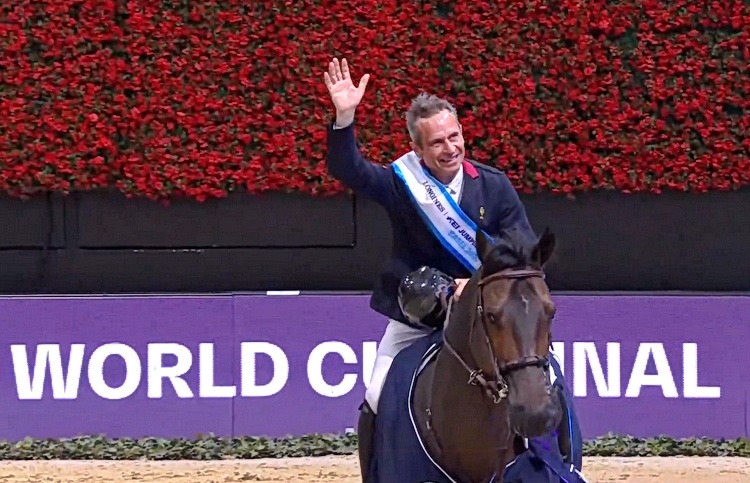
by Nancy Jaffer | Apr 6, 2025
From start to finish, over three days of competition in Basel, Switzerland, Jullien Epaillard took the lead in the Longines FEI Show Jumping World Cup and never let it go.
Over four rounds of jumping, he and his homebred Donatello D’Auge dropped only a single rail in the electric atmosphere of the St. Jakobshalle arena, giving France its first victory in the indoor championship since 2004. It was doubly sweet for the French because their Kevin Staut on Visconti du Telman also earned a place on the podium, finishing third behind Great Britain’s Ben Maher, the runner-up with Point Break. Ben did a great job competing despite a broken foot after a non-horse related accident last month.
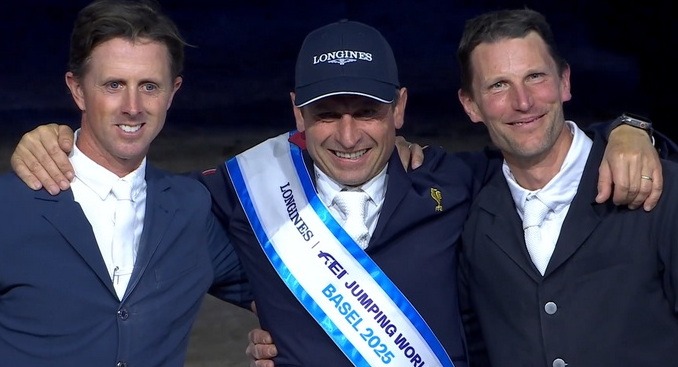
Ben Maher, Julien Epaillard and Kevin Staut.
“My horse was amazing this week,” said Julien, who competed Donny in a hackamore, but brought him back in a bridle for the prize-giving.
“He jumped everything super today. I feel him already the first round a little bit tired. He always wants to help me. He was maybe more fresh for the second round. The round was very difficult. I was maybe a little bit lucky,” Julien said, his accent adding to the charm of his broad smile.
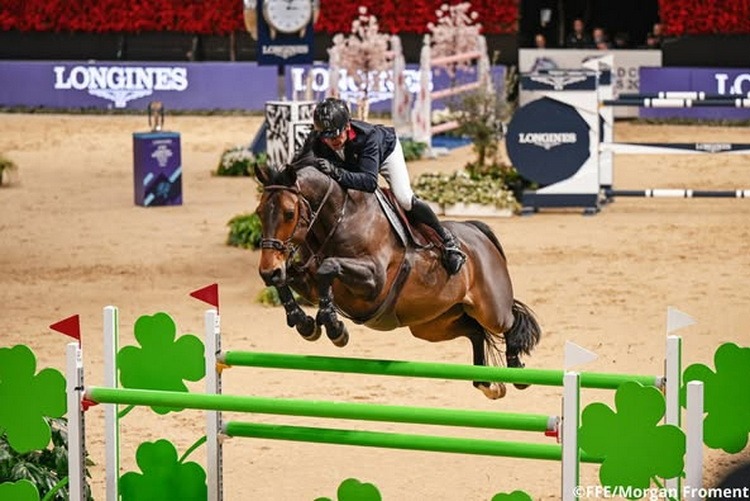
Julien Epaillard and Donatello D’Auge on the way to victory. (Photo French Equestrian Federation)
The winner admitted losing his concentration as he headed for the last line of three fences. He thought, “I’m close, I’m close,” which distracted him.
“I come too deep to the double,” and down went a pole at the first element of the shamrock combination.
“I think if I helped him a little bit more, I can (could have) jump a clear but it’s okay. In any case, it’s okay like this. It’s a dream for the staff and the family. We work every day for this. A lot of people are around this performance and thanks to everybody.”

Sunday’s course B.
Julien took a chance by declining to compete in the jump-off on in the second segment on Friday. He hoped the math of the complicated World Cup standings formula would keep him in first place without having to tire his horse in another round, and he was right.
Gerard Lechat, the course designer, said he started working on his plans for the routes six weeks ago.
Then “I change every day,” he said, admitting to some nervousness in laying out his first championship. But he despite his worries, he did a fabulous job.
The jumps were interesting and eye-catching, including a triple combination featuring cherry blossoms and a “cheese” wall (naturally, it was Switzerland).
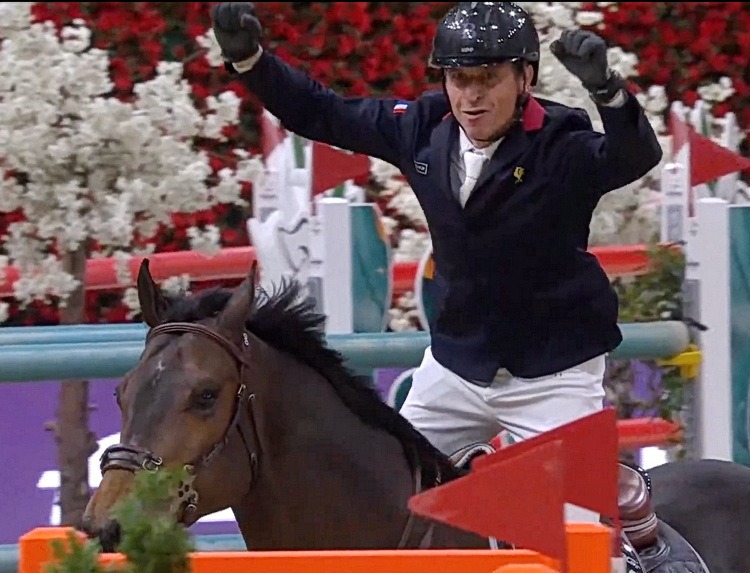
A jubiliant Julien wins the Longines FEI World Cup Show Jumping Finals.
The best American, in eighth place overall, was Katie Dinan, appropriately riding a horse bred in the U.S, Out of the Blue SCF.
“You don’t see that so often. It makes it a really special way to be representing the country, and showing U.S. breeding,” observed Katie, the star of the final day, as the only rider to go fault-free over both rounds. That made her the winner of phase three and moved her up from fifteenth place after Friday’s second segment of the competition.
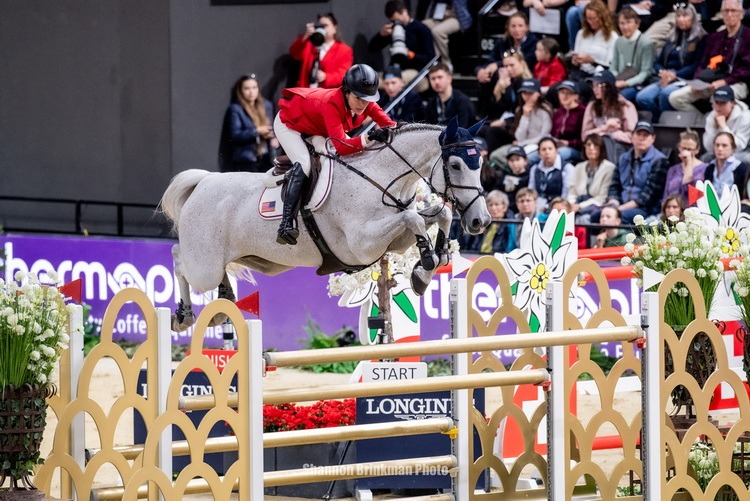
Katie Dinan and Out of the Blue SCF. (Shannon Brinkman photo/courtesy U.S. Equestrian)
Her Belgian warmblood by Verdi TN was bred by Lisa Lourie of Spy Coast Farm in Kentucky and developed until she was nine by Irish rider Shane Sweetnam, who works with Spy Coast. Katie bought the beautiful grey at the end of her 9-year-old year.
“I can’t believe it, I’m so happy,” said the rider, who is trained by 2007 Cup winner, Beat Mändli of Switzerland.
“Bridie is just amazing,” Katie said, using the mare’s nickname.
“I’m totally obsessed with her. I hope she knows that. She has a lot of personality. She’s actually a warm and fuzzy sweet horse. She definitely sets her own schedule and does whatever she wants.”
Katie noted the mare, “loves going out in the field. I take her on a lot of trail rides. That’s probably her favorite thing. She’s super brave and has so much range.”
Bridie can jump in a grass field or a small indoor arena like Basel, Katie noted.
“She’s so smart. She just gets it and adapts.You realize the more you do this, sport horses and partnerships like this don’t come around every day.”
The USA’s Lillie Keenan, tied for third going into the last day, wound up eleventh overall. She was fault-free aboard Kick On in Sunday’s first round, but dropped three rails in the second round.
The other U.S. riders on the last day also had problems. Kristen Vanderveen was clear in the first round with Bull Run’s Jireh, but toppled three fences in the second to end the show in nineteenth place. Caitlin Campbell and Castlefield Cornelious were clean in the first round but she fell off at the third fence to wind up twentieth overall.
Alessandra Volpi was the other U.S. rider to qualify for the top 25, but she withdrew Gipsy Love after she was a bit sore Sunday morning following a heel grab earlier in the week. She was third on the second day of competition.
“I’m so proud of her amazing effort in Basel,” said Alessandra.
U.S. Coach Robert Ridland observed, “We had some really great results this week in Basel, and a few of our younger combinations really stepped up and showed off some class riding.
“I was really impressed today in the first round when all four of our combinations laid down clear rounds. For Katie to finish the way she did with Out of the Blue SCF was very impressive, considering none of the other combinations in the whole class delivered two consecutive clear rounds today.”
Click on this link for overall results from the Longines FEI World Cup Show Jumping Final
Click here for results from Sunday’s final round
click here for results from Sunday’s first round
click this link for standings after Sunday’s first round
click here for standings after Friday’s round
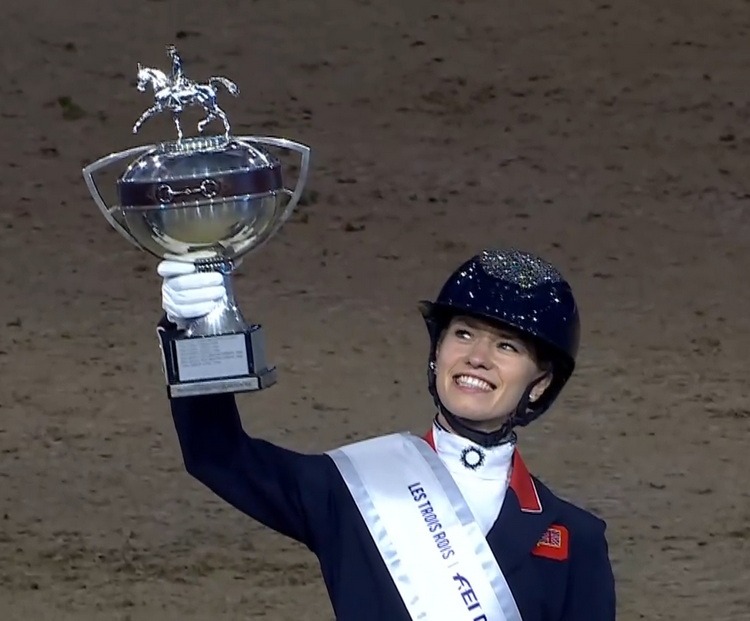
by Nancy Jaffer | Apr 5, 2025
You can’t always count on a foregone conclusion in dressage, but victory in the Longines FEI World Cup Final for Lottie Fry and the appropriately named Glamourdale had all the earmarks of a sure thing.
And that’s the way it turned out on Saturday night in Basel, Switzerland, where the British combination topped a field of 17 to take the title. Lottie’s freestyle earned the first marks of 10 seen in the competition, and she was in full control of her stallion all the way through. He made his entrance to the notes of “God Save the King,” with precise steps of passage, and demonstrated spectacular moments with a flamboyant extended canter
His winning percentage of 88.195 was not a personal best, but still reflected great suppleness bordering on awesome. The ride got 10s across the board for the music and its interpretation.
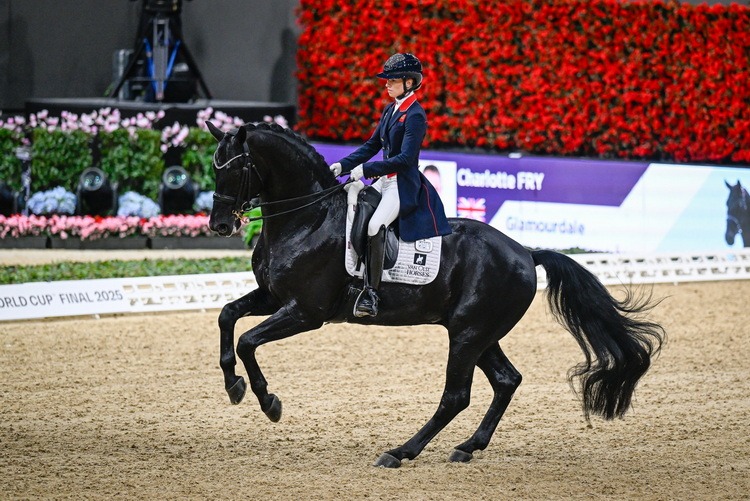
Lottie Fry and Glamourdale. (MD Asadul Islam photo)
“This is very special. To win here today is absolutely amazing, and it felt like Glammie loved every second of it,” said Lottie.
“Yesterday (Friday), Glammie was definitely a little intimidated by the hall, but today he knew his job. He loves to have all eyes on him, and when the crowd joined in, he seemed to love it even more,” said Lottie.
“This is all a team effort, with everyone at home at Van Olst Horses and all our supporters. Everything came together tonight, this is such a special feeling,” she said,
Germany’s Isabell Werth, riding in her twenty-sixth Cup finals, missed taking the title for the sixth time, but made the most of her horse, DSP Quantaz to come in second on 84.365 percent. Third with a percentage of 81.850 went to Norway’s Isabel Freese with Total Hope OLD, a son of the great Totilas, who won the Cup finals, out of Isabell Werth’s World Cup winner, Weiheigold. Norway has never before been on the podium for a dressage championshps;.
Two of the three Americans competing improved their standing from Friday’s Grand Prix, but that was not the case for Adrienne Lyle, the most experienced and decorated rider of the trio. The Olympic medalist had to deal with a mount who was overly impressed by the atmosphere. That led to some expensive mistakes, including a break into the canter from the extended trot early in her performance.
” He’s a hot and feisty horse,” she said after her ride.
“Yesterday in the Grand Prix, I was really happy with the relaxation we were able to show. Today, he felt super in warmup He just got so excited going down that tunnel into that big stadium. the music and the people. You could feel the energy… and incredible environment. and that just pushed him over the edge.”
A mistake in the flying changes every two strides proved expensive, with four marks of 4 and one 5.
When Adrienne tried to soften her hands, “he lost balance a little, and I had to hold him a bit more. By the end of the test, I was able to at least soften a little and try to lengthen the neck and all those things we work every day on. He is a hot, sensitive horse. That’s part of what I love about him. It’s also part of what makes him challenging.”
She wound up sixteenth, a big drop from placing ninth in the Grand Prix.
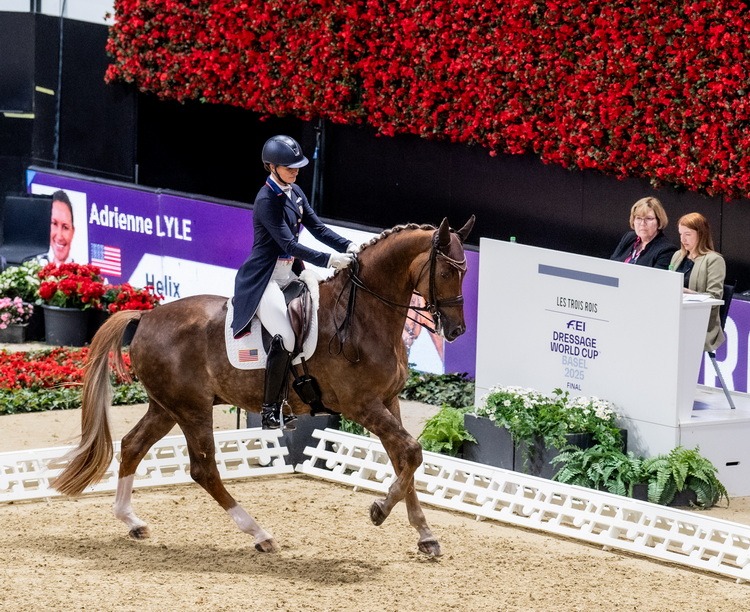
Adrienne Lyle and Helix. (©ShannonBrinkmanPhotography/Photo courtesy U.S. Equestrian)
Even so, she noted, “Any time you get to represent your country, it’s such a huge honor. And there’s such a big support team behind you. You’re riding for your owners, your federation and everyone who’s there who helped you get down centerline. I never take it for granted.”
Adrienne always shows her class, win or lose. She’s a terrific representative for her sport.
As she noted, “Such is life with horses and we will continue to learn from each experience, try to improve our riding and our relationship, and hopefully come out as better horse people on the other side of every situation that doesn’t go as planned.”
Her compatriot, Kevin Kohmann, got a big promotion, up to tenth with 75.535 percent, from fourteenth in the Grand Prix.
He heaped praise on his mount, Duenensee, a 16-year-old Hanoverian he rode in his first World Cup Finals in Riyadh, Saudi Arabia, last year.
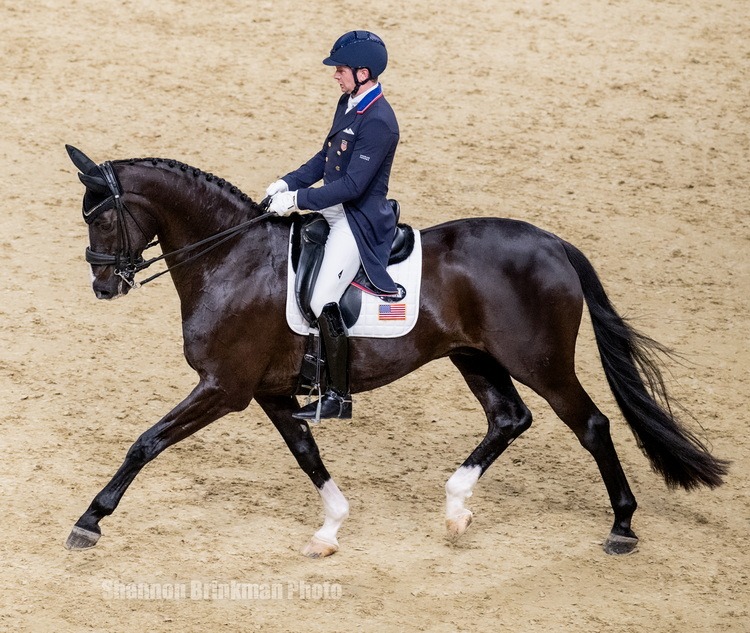
Kevin Kohmann and Duenensee. (©ShannonBrinkmanPhotography/Photo courtesy U.S. Equestrian)
“I’m speechless,” said Kevin, who was obviously very emotional about his horse and his performance.
“The horse was once again amazing. He gave me everything in there. We had some awesome highlights. My horse walked (in)to the piaffe, he walked out of the piaffe, it seems to be a movement that really relaxes him. Three years ago, I never would have thought I could make something like this. Our relationship has grown so much. I’m so proud of this. I’ve never ridden in an atmosphere like this.
“The people are so close. I rode this one pirouette near the short side and I was looking in the eye from the people in front of me. My horse did not even flinch an ear.”
Genay Vaughn, in her first World Cup finals, was promoted from last place on Friday when her horse got his tongue over the bit, to fourteenth with a score of 73.765.
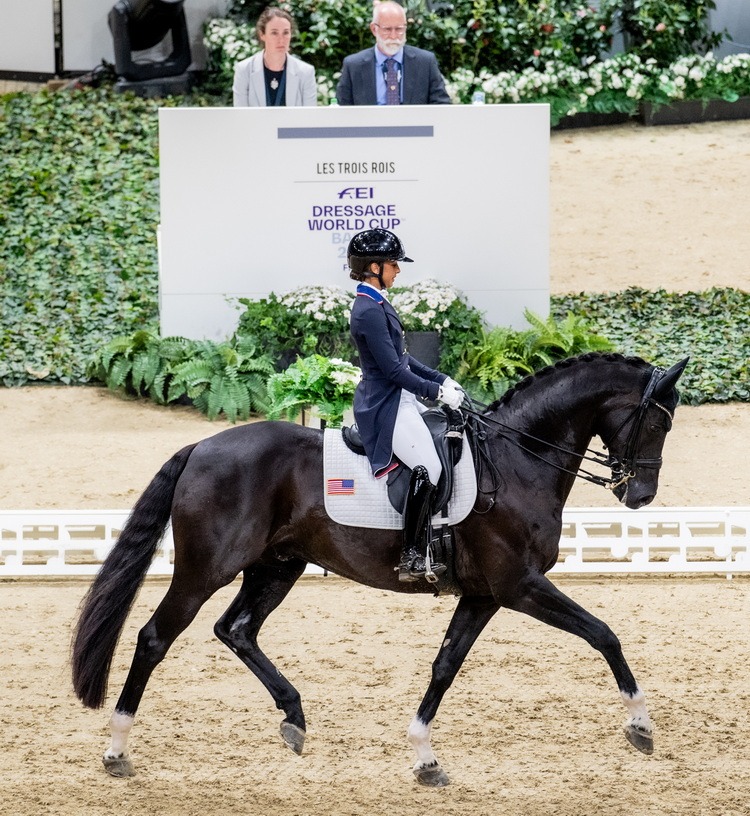
Genay Vaughn and Gino. (©ShannonBrinkmanPhotography/Photo courtesy U.S. Equestrian)
“He had so much confidence compared to yesterday,” she said of Gino.
“It’s our first real indoor stadium event and also our first World Cup. So to see him start to feel more confident in there made me ecstatic,” the Californian noted.
“We both were confident. All of it was so fun. I was just so happy with him.”
Noting family and friends flew over to support her, she said, “It’s been amazing.”
Click here for results
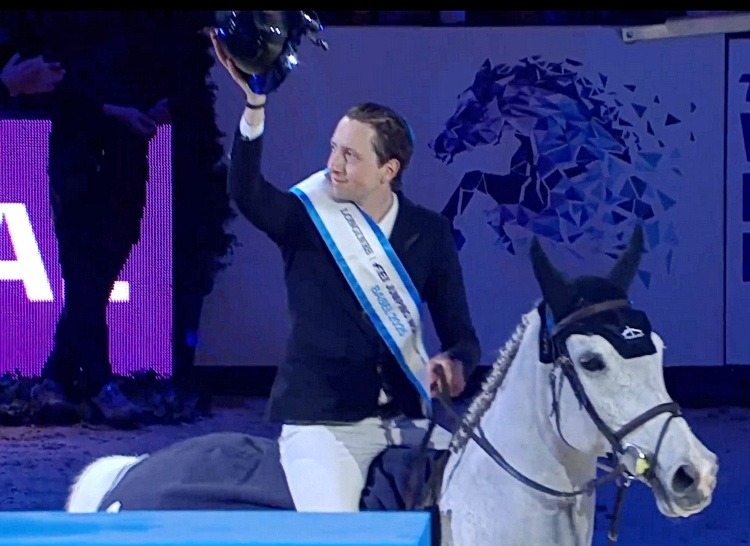
by Nancy Jaffer | Apr 4, 2025
Julien Epaillard took a chance.
The Frenchman, who led after Thursday’s opening round of the Longines FEI Show Jumping World Cup Final, decided not to compete in what would have been a six-horse jump-off for Friday’s second leg of the championship in Basel, Switzerland. He wanted to save the strength of his horse, Donatello d’Auget for Sunday’s two-round final.
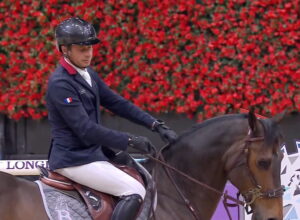
Julien Epaillard
But he didn’t have the hard data to assure that he would stay in the lead without participating in the tie-breaker, because the math was too difficult to do by hand. So he could only guess.
“It’s complicated to calculate this. So we take the risk,” he explained.
“It was not an easy decision. We think a little bit with the staff of the (French) federation.”
As it happened, he guessed right.
Marcus Fuchs, riding “my incredible unicorn” Leone Jei for the host country, won the class with “two risky turns.” But because the Swiss campaigner was tenth the first day, he is four points behind Julien in the overall standings. Julien figured it would be something like that, but couldn’t be sure when he withdrew from the tiebreaker.
A former European champion, Marcus was clocked in 40.77 seconds over a challenging jump-off course. Austria’s Max Kuhner with Elektric Blue P was second in 42.32, while Alessandra Volpi became the second U.S. rider of the show to make the podium. She was third on the clever mare, Gipsy Love in 45.78 seconds.

Gerard LaChat’s course.
Rather than spending the evening celebrating after his win, Marcus planned on going back to his hotel room to study the tapes of his rides and “see what I can improve on Sunday.”
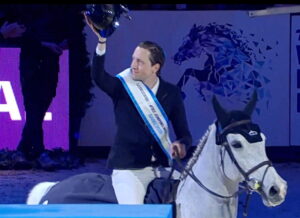
Marcus Fuchs and Leone Jei.
Alessandra had said beforehand that she wouldn’t go all-out in the tiebreaker, with a thought process similar to Julien’s, that her mare needed to have reserves of strength for Sunday’s stringent test.
“It’s hard to catch these guys.. But I wanted to make sure she was in good shape for Sunday,” commented Alessandra, who trains with Markus Beerbaum of Germany.
“I couldn’t have asked for more. That’s what you dream of here,” continued Allessandra, praising her Silesian mare.
“It’s taken us a bit of time to get to know each other, because she is tricky and she really likes things the way she wants them, but I feel like now that we’re coming together as a combination, we’ve put in a lot of solid rounds, and it’s helped us build a lot of confidence and that’s paying off,” the Californian added.
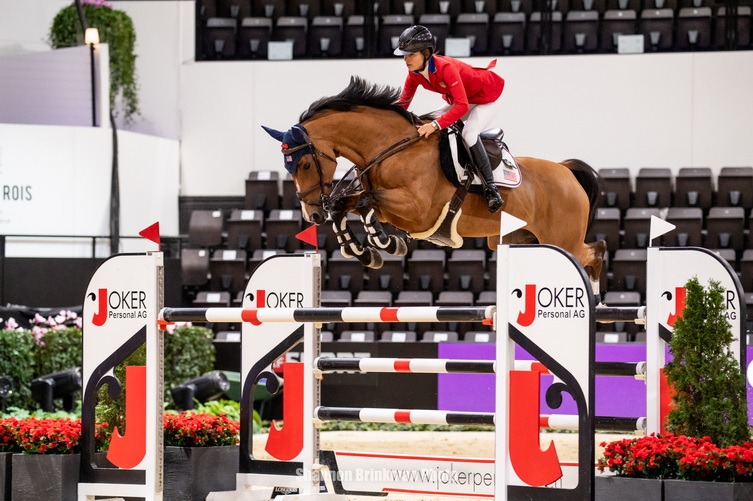
Alessandra Volpi and Gipsy Love. (©ShannonBrinkmanPhotography/Photo courtesy U.S. Equestrian)
“She still tried her hardest. I knew a solid clear round could get you pretty far. I didn’t expect to be in such a great position. That lack of expectation has gotten us this far. We still have a job to do on Sunday, so stay focused.”
The USA’s Lilllie Keenan, who was third on opening night, had a rail in the first round to finish ninth with Kick On and is tied for fourth overall.
The biggest U.S. show jumping names, Kent Farrington, McLain Ward and Laura Kraut, aren’t competing in Basel. But U.S. Coach Robert Ridland is proud of the riders who are.
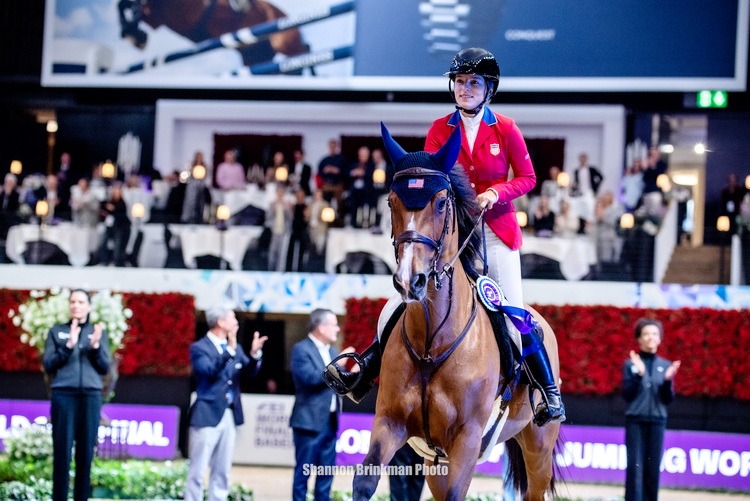
Alessandra Volpi enjoys the victory gallop. (©ShannonBrinkmanPhotography/Photo courtesy U.S. Equestrian)
“We sent a group over here, a young group, but one that we’re excited about. And now we’ve been on the podium both nights. Pretty good.”
Click here for a link to Friday’s World Cup dressage story.
Click here for results of second World Cup competition
Click here for World Cup standings after second leg
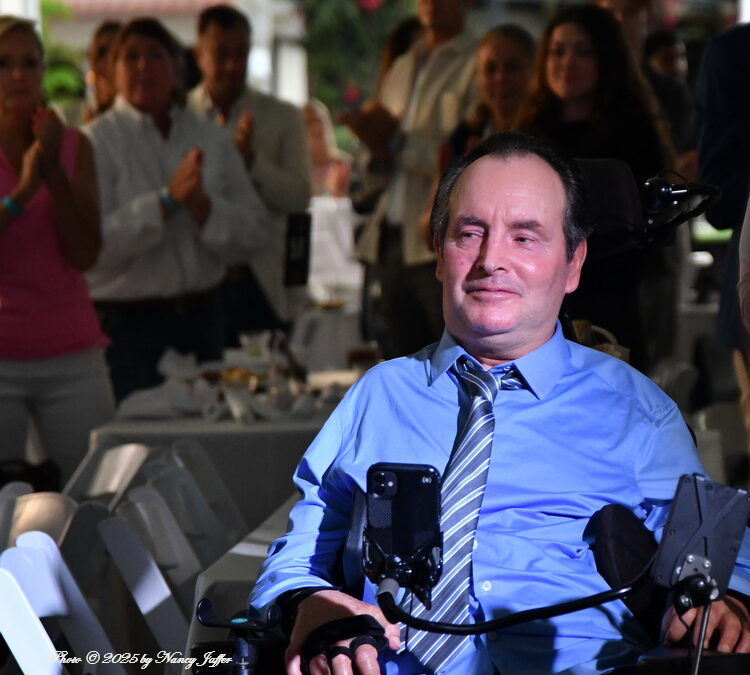
by Nancy Jaffer | Apr 2, 2025
With so many social events in the Wellington, Fla., area during the Winter Equestrian Festival, it takes a lot for one to stand out, especially at the end of an intense 12-week circuit.
Yet Kevin’s Rockstars Lip Sync Fundraiser was a spectacular sellout last weekend, an evening to remember. Despite the zany name, it’s serious business, bringing in impressive amounts of money for the Kevin Babington Foundation.
Although the paralyzed show jumper is the foundation’s namesake, the charity also gives grants to other athletes who, like Kevin, have sustained spinal injuries while show jumping.
Kevin fell with his horse in a grand prix nearly six years ago, and since then, life has been a constant battle, as he has to rely on aides and family members for nearly everything. After being treated last month for a life-threatening case of pneumonia, Kevin got out of the hospital just a few days before the party. His aides and three Intensive Care Unit nurses stood up and rightfully were acknowledged at the festivities.
In typical Kevin fashion, as soon as he was discharged, he was back teaching, passing on his knowledge to help others with their horses.
“That’s what I love,” he explained simply. His daughters Marielle and Gwyneth are also professional equestrians; Marielle works with the family’s horse business in Florida, while her sister rides with Olivier Perreau in France.
Kevin had been worried he wouldn’t be able to attend the Foundation fundraiser, but with his typical resilience, the Irish Olympian was determined to be part of it.
“They would have had to chain me down not to come here tonight,” he told me, as he sat smiling in his wheelchair and ready for what he called “a great craic,” an Irish expression signifying great fun.
The event had started four years ago as a “bit of a lark, a drag night with the Irish guys,” Kevin recalled, and grew from there into quite a production, with familiar faces from the show world transforming themselves into their favorite recording artists or characters from the songs that they lip synched.
The stage presented professional lighting and backdrops, all beneath a large tent on the picturesque Hatfield family farm. The Hatfields also made a $100,000 donation to kick off the evening, and energetic bidding overseen by emcee Jimmy Torano brought more contributions into the till.
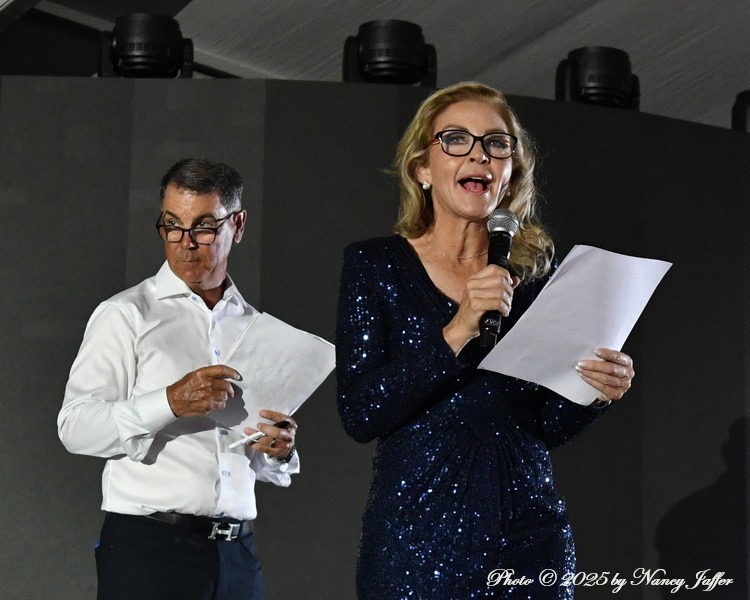
Emcee Jimmy Torano and Dianna Babington. (Photo © 2025 by Nancy Jaffer)
Kevin’s energetic wife, Dianna, spoke of the “fantastic community of love” that has wrapped its many arms around the cause.
As Jimmy, also a show jumper, acknowledged what Kevin has gone through, he pointed out, “This could be any of us.”
Dianna mentioned that when she’s working in the VIP tent at WEF and “I hear the calamity of (falling) rails, I just feel this moment of `Oh My God’…and hold my breath for a minute.” Thankfully, there are few accidents as serious as Kevin’s, but she is always aware of what could happen.
The event is the most special night for Kevin, who got a standing ovation when he spoke to the 500-strong crowd.
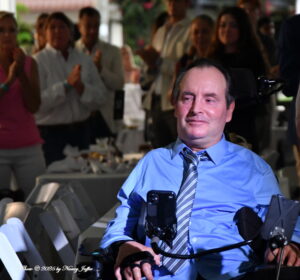
Those attending the fundraiser stood and clapped for Kevin when he spoke. (Photo © 2025 by Nancy Jaffer)
“I’m blown away every year. Because I’m always worried about, are we going to get enough people here? And it sells out. It’s not just supporting me, it’s supporting what the Foundation stands for,” Kevin said.
“I hope it doesn’t have to have too many other riders, but it’s there for them.”
Dianna said items paid for by the Foundation include round-the-clock aides and a special mattress for Kevin, all necessities that aren’t covered by insurance. It is used for big picture items, not the electric bill or the mortgage.
Kevin recalled the roots of the Foundation, explaining, “A group of friends got together to start a foundation for me and now look what it’s grown into,” with the subsequent involvement of Jeff Papows, its chairman.
“I never in a million years would have expected this,” said Kevin, as he looked around the crowded tent.
“I actually pinch myself all the time.”
Richard Goodall, the Indiana school janitor who won America’s Got Talent last year, kicked off the evening with his rendition of “Don’t Stop Believin’,” which could be Kevin’s anthem.
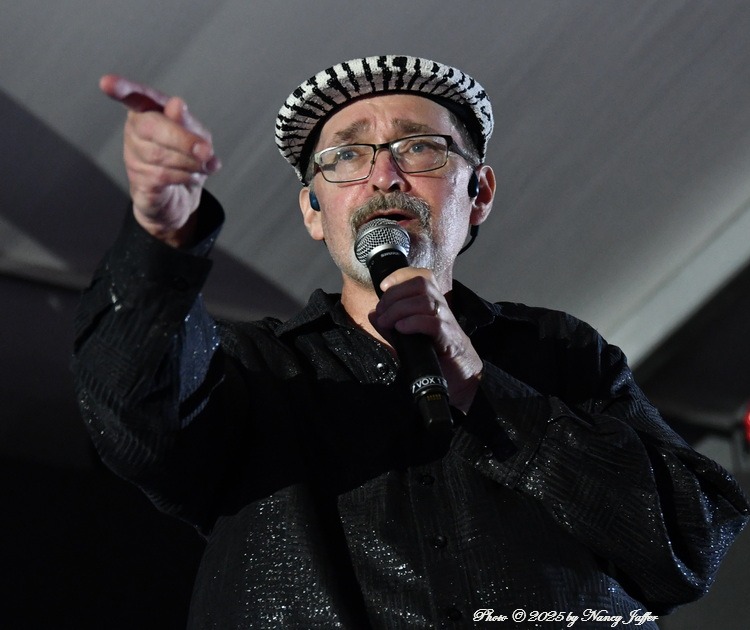
Richard Goodall sang “Don’t Stop Believin'” the theme song of the fundraiser. (Photo © 2025 by Nancy Jaffer)
Dianna told the crowd, “ `Don’t Stop Believin’ ’ is completely relevant, as it embodies everything the Foundation is about and everything that keeps each and every one of us that is involved in paralysis able to get up each and every day to carry on with their lives. We cannot stop believing that something will break in the medical community and… restore people’s mobility.”
She and others working with the foundation keep up with the latest medical advances for helping paralysis victims to someday move on their own. Jefff said he has a Google alert on his computer network that searches for anything to do with paralysis.
“One of these days, there’s going to be a breakthrough that will improve his (Kevin’s) quality of life significantly further,” Jeff predicted.
Among those Dianna cited is Onward Medical out of Switzerland. Their Arc-Ex medical device, which received FDA approval in January, is not invasive. Instead, it sends impulses to activate dormant neural pathways. As Dianna pointed out, there have been “huge strides” since actor Christopher Reeve’s accident. An amateur eventer, he was paralyzed after a 1995 cross-country fall and remained in a wheelchair until he died in 2004. He had actively lobbied for spinal injury research.
Dianna, who Kevin called, “My first and foremost advocate through this whole thing,” is nothing if not versatile. As a child, she was “Little Miss New Jersey,” went on to model, act in films during high school and college, and worked as a professional cheerleader for the Nets professional basketball team. Then she pursued her interest in horses, taking lessons with Gary Kunsman at Four Seasons Farm.
For the Lip Sync, she put her show biz background to use with a very professional performance as J Lo while Marielle (wearing a bald wig that took two hours to put on properly), played Pitbull in their convincing rendition of “On the Floor.” They were helped along by back-up “singers,” including show jumpers Schuyler Riley and Lacy Morrone-Cramer. The whole effort took quite a few rehearsals.

Dianna Babington (J Lo) with her daughter, Marielle, (Pit Bull) do their lip synch with the Sirens. (Photo © 2025 by Nancy Jaffer)
In addition to lip sync acts, the evening included real singers, Heather Caristo Williams and Ki-Juan Minors, the first winner of American Equestrians Got Talent. It was a great opportunity to show off the non-riding abilities of people in the horse show community.
Kevin Rose of Ken Rose catering served a meal that touched all bases with barbequed brisket, mac and cheese and dumplings, as well as crème brulee and cheesecake shooters.
Mike Cruciotti worked with the production aspects of the show. Trainer Missy Clark received an award for encouraging people to put together acts featured during the evening. Others who received acknowledgement included Carol Coleman and Victoria McCullough, but there was a host of volunteers who helped things run smoothly.
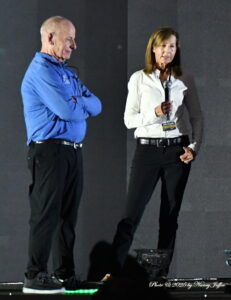
Kevin Babington Foundation Chairman Jeff Papows and Missy Clark. (Photo © 2025 by Nancy Jaffer)
The subject of air vests came up during the evening.
“I was never one to push anything on anybody,” said the guest of honor.
“I’m not sure if a vest would have saved me, there’s a very good chance it would have,” Kevin noted.
“Even if you only wear it for jumping, just think about it. I would have been one of those macho guys that would be the last person to wear the vest, which is completely stupid.”
The research on the effectiveness of the vests is not complete, but Jeff said, “I think it’s something every equestrian has got to consider very seriously.”
Kevin has aides with him around the clock every day of the year. Jeff noted “the Foundation has developed connections with the best and the brightest doctors and hospitals and labs around the world
“That said, he still lives in a very compromised state.”
Jeff added, “The financial cost of these kinds of injuries is catastrophic. It’s not just the injured athlete; it’s the entire family and their entire inner circle that’s affected.” With the aid of the foundation, the patient’s family is “going to be able to see them with a reasonable quality of life without compromising theirs.”
The event raised a record amount,
“It was a significant success and makes up a useful part of our annual operating budget,” said Jeff.

The scene at the party. (Photo © 2025 by Nancy Jaffer)
“The tragic part of it aside, I think it has unified the sport and created a closeness that is hard to describe, but it’s almost mystical,” he observed.
” We’ve got a database of 33,000 equestrians, and the open rate on that is 83 percent which is unheard of. I am constantly in awe of the love and generosity and tightness of the show jumping community. Talk about a sport and a community coming together.”
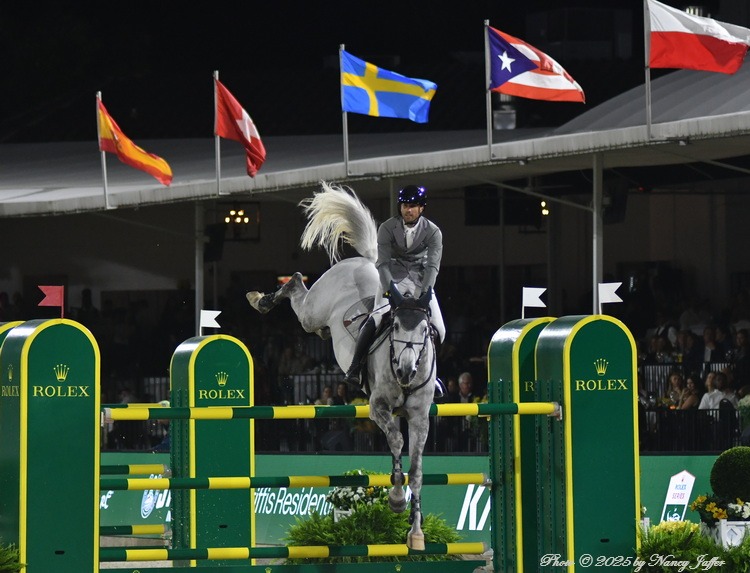
by Nancy Jaffer | Mar 30, 2025
When show jumper Christian Kukuk said he had quite an “incredible” time on Saturday, he wasn’t exaggerating.
It started with the birth of his first child, a daughter named Lila. Then in the evening, the 2024 Olympic individual gold medalist faced and conquered a field of superstars at Florida’s Winter Equestrian Festival in the debut of the $750,000 Rolex U.S. Equestrian Grand Prix, as more than 10,000 enthusiastic spectators took it all in at the Wellington International showgrounds.
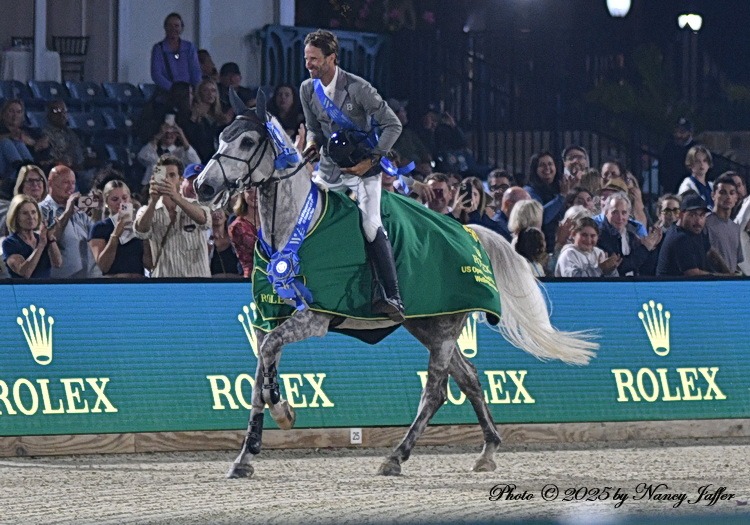
Both Christian Kukuk and the crowd at the Rolex Grand Prix enjoyed his victory gallop. (Photo © 2025 by Nancy Jaffer)
The class, the WEF finale, was part of the U.S. Equestrian Federation’s new U.S. Open series across the Olympic disciplines, and it catered to spectators in an effort to popularize the sport. Fans loved the updated intro on the jumbotron featuring videos of the top riders, and they flocked into the ring when invited at the end of the class so they could get autographs from their heroes.
“To have the quality of riders we have now: Olympic champions, world champions world number one, and to draw the crowds we have, it just shows this sport is a spectator sport and there are fans that want to be a part of this,” said Michael Stone, president of Wellington International.
“To see the kids get so excited to get autographs and photographs with athletes… is special. It’s so important that we bring the sport to everyone. We want to help in growing the sport and this event has set an incredible mark for how we can do that and the kind of people and passion we can get behind it.”
The 40 starters in the first round who tested themselves over Guillherme Jorge’s brilliant course was whittled to eight. How tough was the route set at 1.60 meters (with one fence an inch higher than that)? Those who didn’t qualify for the tiebreaker included world number one Henrik von Eckermann of Sweden with King Edward, world number two Kent Farrington with Greya and McLain Ward on his Olympic partner, Ilex. And there were plenty of other noteworthy competitors who missed the jump-off, among them Britain’s 2021 Olympic individual gold medalist Ben Maher and Dallas Vegas Batilly.
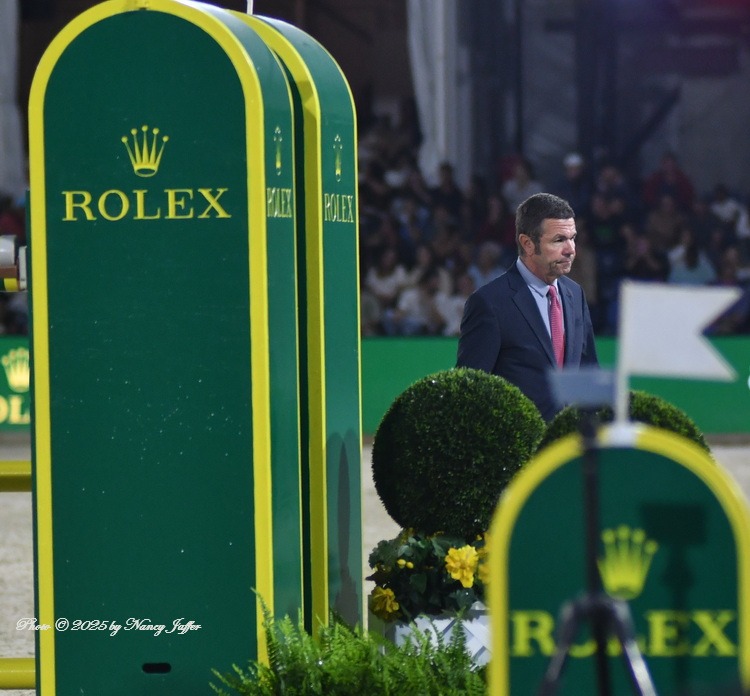
Course designer Guilherme Jorge. (Photo © 2025 by Nancy Jaffer)
The USA’s Laura Kraut, though, was right in the thick of things, demonstrating how her eager mount, Bisquetta, has come along since last year with a bravura blazing trip in 39.49 seconds over the eight fences of the shortened course.
“She has gotten more experience and I’ve taken her to a lot of good venues. Now she sort of understands what her job is,” commented Laura, 59.
She said the Zangersheide mare has moved up to first string status with her Olympic team silver medal mount, Baloutinue, who is sidelined with a small injury. That caused him to miss this coming week’s FEI World Cup Finals in Switzerland. Laura said she is being extra careful with Baloutinue because he is 15.
Her thought process is the same as Christian’s, who said he is conserving his Paris Games mount, Checker 47, because that horse also is 15, and is pointing him toward grands prix and next year’s world championships at Aachen. For this summer’s European Championships, he plans on using Just Be Gentle, winner of the Longines Grand Prix in Ocala earlier this month.
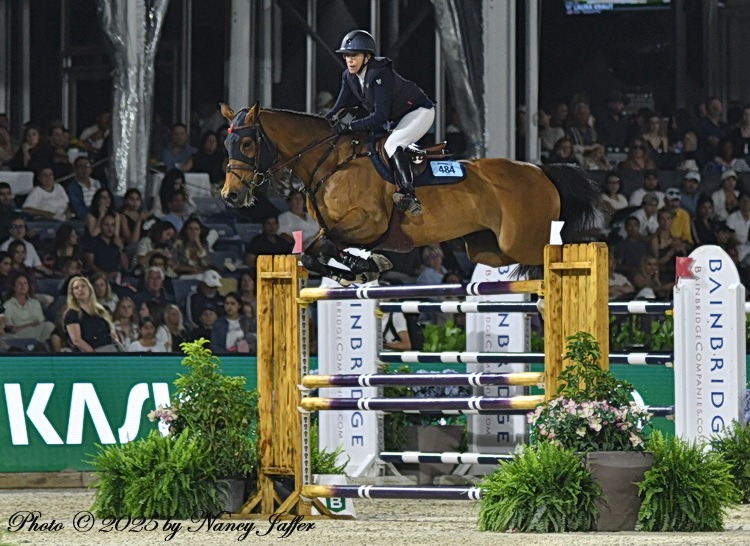
Laura Kraut and Bisquetta. (Photo © 2025 by Nancy Jaffer)
Laura noted she had been a bit cautious in the jump-off and left the door open by adding strides in two places during her ride, and Christian took advantage of that when he and Checker followed her trip.
“I knew that Laura was really fast and I had to try everything,” he explained after his second triumph of the 2025 WEF season.
“There is something special between him and this arena here. He has an extra gear,” Christian observed about the son of Comme Il Faut 5.
The German rider did just enough with the agile grey Westfalen gelding to cut 0.29 seconds from Laura’s time, and there was his victory in 39.20 seconds. He also won the class on his first visit to WEF last year, when it wasn’t part of the Rolex series, and offered less money. But it was still impressive, and I will never forget his 2024 victory gallop with the ribbon clutched in his teeth!
Third place went to Ashlee Bond, 39, representing Israel on her always steady Donatello 141, clocked in 40.41 seconds. The Westfalen won the USA’s only $1 million grand prix last December in Thermal, Calif.
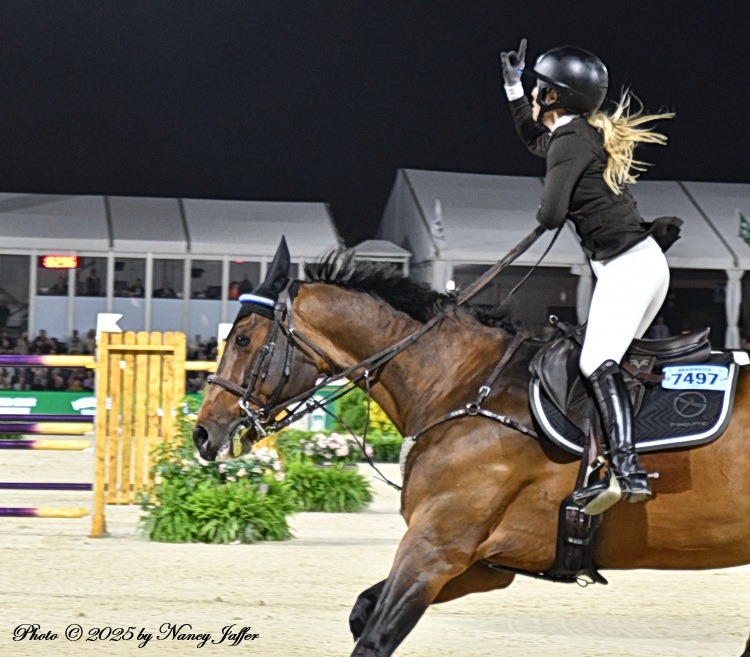
Ashlee Bond was overjoyed to turn in the first clean round (Photo © and2025 by Nancy Jaffer)
Ashlee and Donny have been together for nine years and move as a unit, honed by a depth of experience. Although Donny is only 15..3 hands, smaller than most of his rivals, he makes up for it with determination and a desire to do well for his rider.
“He turned himself inside-out for me,” said Ashlee, and this despite the fact that he wasn’t as energetic as usual after an infection in his throat from an allergy. He won’t do any more championships, but she plans to prolong his career for as long as he wants to do it. After that, “he can give my daughter pony rides because he likes to do that, too.”
Christian packed a lot into the hours of March 29, and after his victory he still seemed stunned–but thrilled–about how it all turned out.
He explained everything with a big smile on his face.

Christian Kukuk was mobbed by spectators as he signed autographs after his victory. (Photo © 2025 by Nancy Jaffer)
“My wife, Veronica was pregnant and the due date was actually next week,” the 35-year-old rider recounted.
“Perfect, right after week12 (the last week of WEF). I was hoping she’d at least wait until Sunday (the day after the Rolex Grand Prix).”
However, they had to go to the hospital Friday night as the baby was on her way.
“Everything went really well. Both are healthy. I honestly can’t wait to see them again,,” said Christian.
“It’s a story you cannot really imagine,” he continued, adding he looks forward to telling the tale to Lila when she is older.
And for his part, he said, “I will always have very, very special memories of her birthday.”
Click here for results.
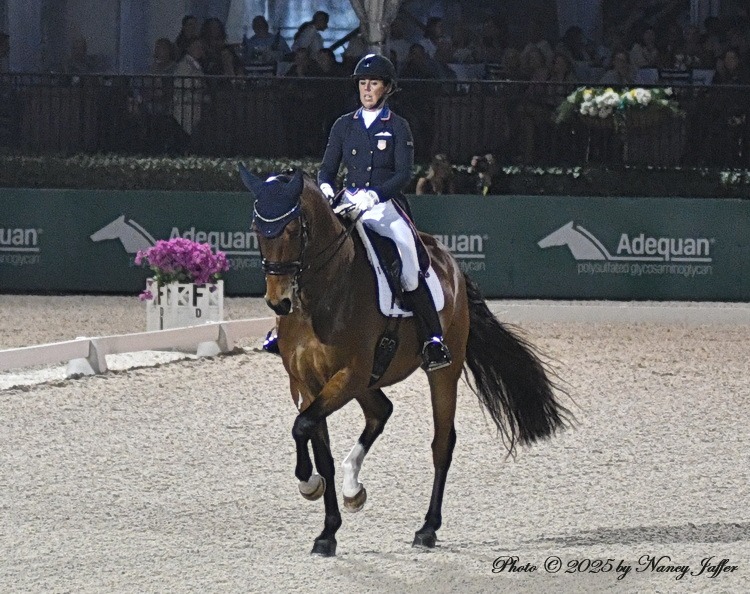
by Nancy Jaffer | Mar 29, 2025
Heartbeat is a character.
The Dutchbred son of Charmeur doesn’t like other horses, wears a hood with sound-dulling earpieces so he can sleep and has been a “bit of a project,” over the last three years, revealed his rider, Kasey Perry-Glass.
But it has all come together, as demonstrated Friday night when he won his second Grand Prix Freestyle of the season at the Adequan Global Dressage Festival in Wellington, Fla., with a score of 75.915 percent. He danced to an original score by Tom Hunt that featured the sound of a heartbeat.
Kasey got help from Ali Brock, who rode with her on the 2016 Olympic bronze medal team.
“I can’t thank Ali enough; she knows how to coach. And she doesn’t ruffle feathers…making sure everyone’s on the same page. She’s been with Heart since the moment I got him,” said Kasey, who enjoys working with a “teammate.”
Adrienne Lyle, who rode with Kasey on the 2018 silver medal World Equestrian Games team, helped design her Freestyle. The riders have been working together since Debbie McDonald stepped away from teaching.
Heart previously was ridden by Dutch competitor Thamar Zweistra, which meant “he was crank and pull, so just to make him a small person ride has been a lot,” Kasey commented.
She rose to fame with Dublet, now happily retired to her family’s California farm, where he shares his pasture with a pony and a mini-donkey.
There were multiple times that Kasey was supposed to go to Europe to look for Dublet’s successor, but her mother-in-law, Jill Glass, kept getting sick.
Although she was in hospice, Jill didn’t want Kasey to cancel her trip.
“You have to go,” Jill told Kasey, who was reluctant to be away at such a difficult time.
“The day I left, she passed away, so to find a horse named Heartbeat…” Kasey said, noting she feels very close to the family of her husband, Dana Glass.
Heartbeat wasn’t a slam-dunk.
“Everything about him was a bit hot. His trot was so mechanical,” Kasey recalled.
But “I tried him and we just clicked.”
The 12-year-old continues to develop, and his freestyle was a testament to how far he has come in his transformation.
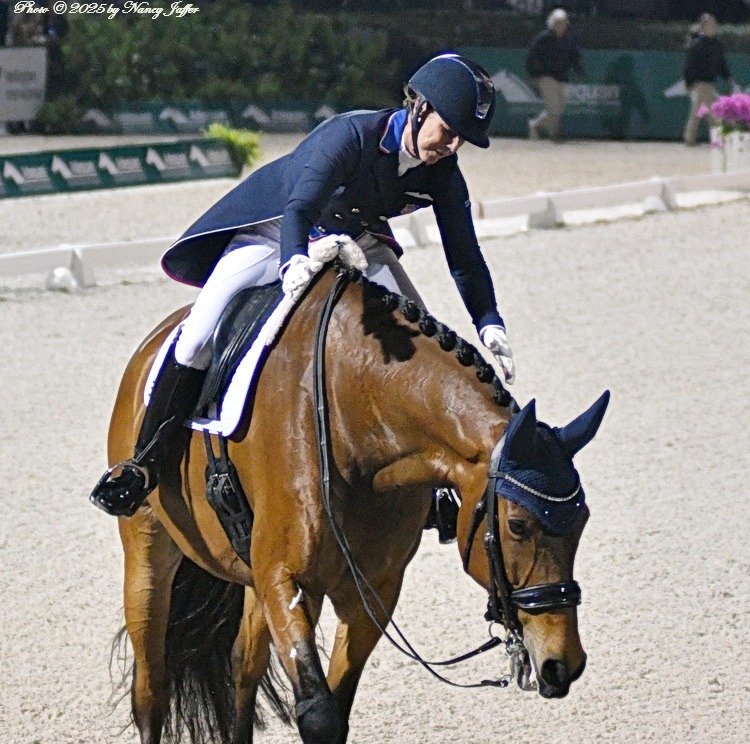
Kasey Perry-Glass thanks Heartbeat for his winning effort. (Photo © 2025 by Nancy Jaffer)
“There was a lot of power and a lot to contain, but I’m starting to be able to manage it,” said Kasey.
“Sometimes Heart tries to overpower me, but tonight he proved that he can keep the power underneath me. It’s about figuring out what works for him, but once I get in the ring, he’s a true showman and he stepped up.”
Kasey is hoping to go to Europe later this spring with a U.S. team tour.
She was second Thursday to Marcus Orlob and Jane in the Grand Prix qualifier, but Marcus opted to do the Special instead of the Freestyle. (to read story, click this link.)
The Freestyle runner-up by a little more than a point, scoring 74.840 for her ride to a Neil Diamond medley, was veteran Ashley Holzer on Hawtins San Floriana. The Hanoverian mare was developed in Britain by Carl Hester and Charlotte Dujardin.
There was a period of adjustment with a “made” horse for Ashley, who usually brings her mounts through the levels herself.
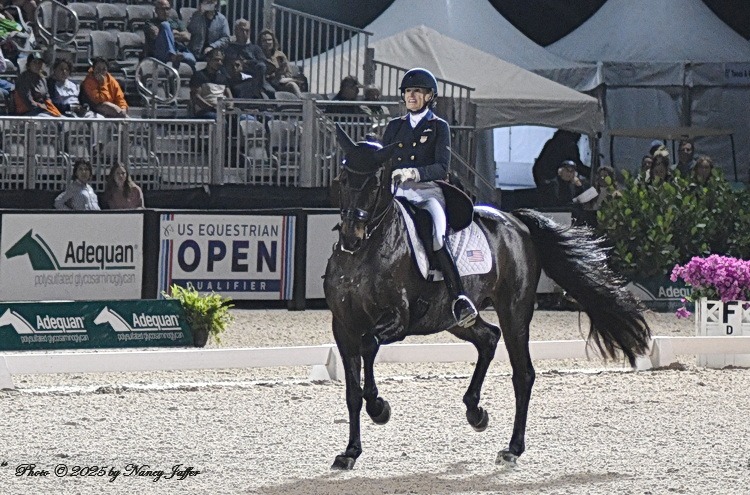
Ashley Holzer and Hawtins San Floriana. (Photo © 2025 by Nancy Jaffer)
“I took her to Carl’s last summer and worked on trying to create a partnership. It’s really just in the last few weeks that I’ve started to feel that she’s speaking my language. She really tries so hard, and it’s special when you feel a horse start to become your teammate,” she reported.
Third in the field of 10 was Canadian Camille Carier Bergeron, an Olympic veteran like the others on the podium. She said of her ride aboard the Oldenburg mare Finnländerin, “That test was one of the times she’s felt the most relaxed and most connected with me; very accessible. The trot tour felt like a win to me, and the piaffe/passage.”
Despite some hiccups in the lead changes as her test drew to a close, Camille said, “I was really happy with her.” She was marked at 73.370 percent.
Janet Foy, head of the ground jury for the class, said of the officiating experience, “That was really fun for the judges. I’m a dancer (she competes in ballroom dancing), so there was a lot of great stuff going on in there. The top five or six horses were really special and did a great job.”
Click here for Freestyle results




































